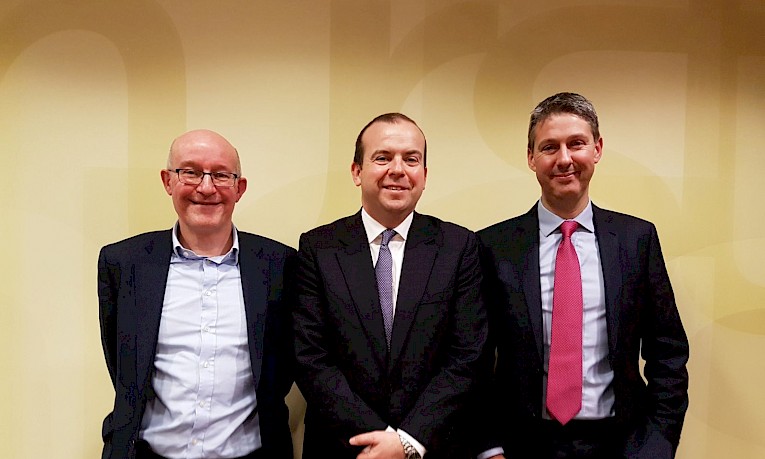15 January 2018 6.00pm
2018 Outlook for the UK Economy
In the first Evening Meeting of 2018 and the first as the Society of Professional Economists, we had two pre-eminent UK economists discuss the UK economic outlook.
George Buckley, from Nomura, while upbeat on the global backdrop, argued that the UK economy would perform more weakly this year and beyond as a consequence the ongoing Brexit negotiations. Uncertainty was hampering business investment relative to the strong rates of capex spending in other countries while, at the same time, Sterling weakness had hit consumer spending. Still, the latter should improve according to Buckley as real wages recover, which together with strong exports should prevent an even sharper slowdown in overall growth.

Buckley noted that domestically generated inflation had failed to pick up materially thus far but was confident that the Phillips Curve relationship remained alive and well. That, he argued, implied less slack will eventually push up on domestic prices more significantly which, in turn, would lead to further interest rate rises this year.
At two 25bp hikes in both 2018 and 2019 Buckley’s view was above consensus and market expectations. He justified this by noting a rule of thumb that every 25bp move from the BoE took 0.1pp off the rate of inflation – and that the Bank’s end-horizon forecast was 0.4pp above target.
Garry Young, from NIESR, also started by reflecting on the strength of the global backdrop, noting that the global economy had picked up strongly around the turn of the year, and that prospects for global growth in 2018 were now looking better than they had done even in November. While unemployment was now at low levels in many advanced economies, he was optimistic that global supply could respond positively to a synchronised expansion in demand. Productivity had disappointed in many advanced countries since the financial crisis and this was likely to be due in part to the persistent weakness of demand that had been reflected in low inflation, nominal interest rates and wages that had encouraged substitution of labour for capital. A reversal of this process by means of a sustained expansion of capital investment would allow global productivity and output to grow strongly for a number of years.
Under normal circumstances, the UK would be well placed to benefit from an acceleration in global demand, especially after a well-documented period of weak productivity. But uncertainty surrounding Brexit meant that UK businesses were likely to defer capital investment until there was more clarity about the future trading relationship between the UK and the EU. This was likely to mean that UK growth would continue to lag behind that in other advanced economies over the next year or so.

